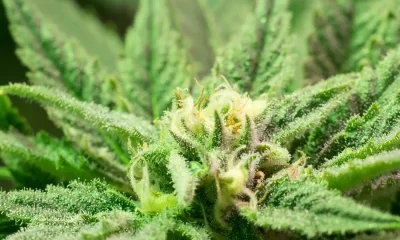Government
Oklahoma Supreme Court To Consider Whether Legalization Initiative Will Qualify For Ballot

The fate of a recreational cannabis proposal in Oklahoma hangs in the balance.
The Oklahoma Supreme Court on Tuesday agreed to settle a dispute surrounding a recreational cannabis initiative that could appear on the state’s ballot this year, giving hope to activists that the proposal may still qualify.
Last week, the prospects for the initiative appeared grim. Although the Oklahoma secretary of state confirmed that organizers had submitted more than the requisite number of signatures for the proposal to qualify for the ballot, supporters lamented that it likely would not be certified before the August 29 deadline.
As the Associated Press detailed on Tuesday, Oklahomans for Sensible Marijuana Laws, the group behind the proposal, known as State Question 820, “gathered enough signatures to qualify…for a statewide vote, but because it took longer than usual to count the signatures, it’s not clear if there is enough time to get the question printed on ballots ahead of the Nov. 8 general election.”
Supporters of State Question 820 petitioned the Oklahoma Supreme Court to settle the matter.
“Since filing their initiative more than six months ago, proponents have done everything in their power to expedite the unwieldy Oklahoma initiative petition process so the People of Oklahoma can exercise their right to vote on the measure at the next general election,” the Yes on 820 campaign wrote in the petition, as quoted by the Associated Press. “Yet they have been stymied by state officials (or their hand-picked vendors) who are either unable or unwilling to perform their administrative duties in a timely and efficient manner.”
On Tuesday, the state Supreme Court “issued an order assuming jurisdiction to decide if the state question will appear on the November 2022 ballot,” according to Tulsa Public Radio, a decision that pleased the SQ 820 campaign.
According to the station, “the measure has to make it through the 10-day publication period before Court Justices will approve it for the general election.”
“We’re actually thrilled,” campaign director Michelle Tilley said, as quoted by local news station Fox 25. “We’re thrilled because the Supreme Court has recognized that we have enough valid signatures to go forward, and we are thrilled because they have left open the possibility that after our 10-day protest period is over, that they have jurisdiction to place this on the ballot in November.”
“We’ve done what we’ve had to do, we’ve really really worked hard,” Tilley added, as quoted by Tulsa Public Radio. “We even turned in our signatures 30 days early. We’ve done everything to try and make these deadlines, and it’s hard. We’re playing by the rules and then the rules change, so.”
The 820 campaign has been stymied in particular by a new ballot system implemented this year in Oklahoma.
The Associated Press reports that “while the Oklahoma Secretary of State’s Office has typically handled counting signatures in house, the process this year involved a contract with a company connected to a political polling firm to provide software and technical assistance to help verify the voter registration status of signatories,” and that as a result, “supporters say a signature-counting process that typically takes two to three weeks took nearly seven weeks to complete.”
“This new process differs significantly from the historical practice of merely counting the number of individuals who signed the petition without regard for their voter registration status,” Oklahoma Secretary of State Brian Bingman said in a statement, as quoted by the Associated Press. “Our office has been in constant communication with the proponents and we look forward to working with them and other interested parties as we continue to improve this new process.”
Business
New Mexico cannabis operator fined, loses license for alleged BioTrack fraud

New Mexico regulators fined a cannabis operator nearly $300,000 and revoked its license after the company allegedly created fake reports in the state’s traceability software.
The New Mexico Cannabis Control Division (CCD) accused marijuana manufacturer and retailer Golden Roots of 11 violations, according to Albuquerque Business First.
Golden Roots operates the The Cannabis Revolution Dispensary.
The majority of the violations are related to the Albuquerque company’s improper use of BioTrack, which has been New Mexico’s track-and-trace vendor since 2015.
The CCD alleges Golden Roots reported marijuana production only two months after it had received its vertically integrated license, according to Albuquerque Business First.
Because cannabis takes longer than two months to be cultivated, the CCD was suspicious of the report.
After inspecting the company’s premises, the CCD alleged Golden Roots reported cultivation, transportation and sales in BioTrack but wasn’t able to provide officers who inspected the site evidence that the operator was cultivating cannabis.
In April, the CCD revoked Golden Roots’ license and issued a $10,000 fine, according to the news outlet.
The company requested a hearing, which the regulator scheduled for Sept. 1.
At the hearing, the CCD testified that the company’s dried-cannabis weights in BioTrack were suspicious because they didn’t seem to accurately reflect how much weight marijuana loses as it dries.
Company employees also poorly accounted for why they were making adjustments in the system of up to 24 pounds of cannabis, making comments such as “bad” or “mistake” in the software, Albuquerque Business First reported.
Golden Roots was fined $298,972.05 – the amount regulators allege the company made selling products that weren’t properly accounted for in BioTrack.
The CCD has been cracking down on cannabis operators accused of selling products procured from out-of-state or not grown legally:
- Regulators alleged in August that Albuquerque dispensary Sawmill Sweet Leaf sold out-of-state products and didn’t have a license for extraction.
- Paradise Exotics Distro lost its license in July after regulators alleged the company sold products made in California.
Golden Roots was the first alleged rulebreaker in New Mexico to be asked to pay a large fine.
Source: https://mjbizdaily.com/new-mexico-cannabis-operator-fined-loses-license-for-alleged-biotrack-fraud/
Business
Marijuana companies suing US attorney general in federal prohibition challenge

Four marijuana companies, including a multistate operator, have filed a lawsuit against U.S. Attorney General Merrick Garland in which they allege the federal MJ prohibition under the Controlled Substances Act is no longer constitutional.
According to the complaint, filed Thursday in U.S. District Court in Massachusetts, retailer Canna Provisions, Treevit delivery service CEO Gyasi Sellers, cultivator Wiseacre Farm and MSO Verano Holdings Corp. are all harmed by “the federal government’s unconstitutional ban on cultivating, manufacturing, distributing, or possessing intrastate marijuana.”
Verano is headquartered in Chicago but has operations in Massachusetts; the other three operators are based in Massachusetts.
The lawsuit seeks a ruling that the “Controlled Substances Act is unconstitutional as applied to the intrastate cultivation, manufacture, possession, and distribution of marijuana pursuant to state law.”
The companies want the case to go before the U.S. Supreme Court.
They hired prominent law firm Boies Schiller Flexner to represent them.
The New York-based firm’s principal is David Boies, whose former clients include Microsoft, former presidential candidate Al Gore and Elizabeth Holmes’ disgraced startup Theranos.
Similar challenges to the federal Controlled Substances Act (CSA) have failed.
One such challenge led to a landmark Supreme Court decision in 2005.
In Gonzalez vs. Raich, the highest court in the United States ruled in a 6-3 decision that the commerce clause of the U.S. Constitution gave Congress the power to outlaw marijuana federally, even though state laws allow the cultivation and sale of cannabis.
In the 18 years since that ruling, 23 states and the District of Columbia have legalized adult-use marijuana and the federal government has allowed a multibillion-dollar cannabis industry to thrive.
Since both Congress and the U.S. Department of Justice, currently headed by Garland, have declined to intervene in state-licensed marijuana markets, the key facts that led to the Supreme Court’s 2005 ruling “no longer apply,” Boies said in a statement Thursday.
“The Supreme Court has since made clear that the federal government lacks the authority to regulate purely intrastate commerce,” Boies said.
“Moreover, the facts on which those precedents are based are no longer true.”
Verano President Darren Weiss said in a statement the company is “prepared to bring this case all the way to the Supreme Court in order to align federal law with how Congress has acted for years.”
While the Biden administration’s push to reschedule marijuana would help solve marijuana operators’ federal tax woes, neither rescheduling nor modest Congressional reforms such as the SAFER Banking Act “solve the fundamental issue,” Weiss added.
“The application of the CSA to lawful state-run cannabis business is an unconstitutional overreach on state sovereignty that has led to decades of harm, failed businesses, lost jobs, and unsafe working conditions.”
Business
Alabama to make another attempt Dec. 1 to award medical cannabis licenses

Alabama regulators are targeting Dec. 1 to award the first batch of medical cannabis business licenses after the agency’s first two attempts were scrapped because of scoring errors and litigation.
The first licenses will be awarded to individual cultivators, delivery providers, processors, dispensaries and state testing labs, according to the Alabama Medical Cannabis Commission (AMCC).
Then, on Dec. 12, the AMCC will award licenses for vertically integrated operations, a designation set primarily for multistate operators.
Licenses are expected to be handed out 28 days after they have been awarded, so MMJ production could begin in early January, according to the Alabama Daily News.
That means MMJ products could be available for patients around early March, an AMCC spokesperson told the media outlet.
Regulators initially awarded 21 business licenses in June, only to void them after applicants alleged inconsistencies with how the applications were scored.
Then, in August, the state awarded 24 different licenses – 19 went to June recipients – only to reverse themselves again and scratch those licenses after spurned applicants filed lawsuits.
A state judge dismissed a lawsuit filed by Chicago-based MSO Verano Holdings Corp., but another lawsuit is pending.
Source: https://mjbizdaily.com/alabama-plans-to-award-medical-cannabis-licenses-dec-1/
-

 Business2 years ago
Business2 years agoPot Odor Does Not Justify Probable Cause for Vehicle Searches, Minnesota Court Affirms
-

 Business2 years ago
Business2 years agoNew Mexico cannabis operator fined, loses license for alleged BioTrack fraud
-

 Business2 years ago
Business2 years agoAlabama to make another attempt Dec. 1 to award medical cannabis licenses
-

 Business2 years ago
Business2 years agoWashington State Pays Out $9.4 Million in Refunds Relating to Drug Convictions
-

 Business2 years ago
Business2 years agoMarijuana companies suing US attorney general in federal prohibition challenge
-

 Business2 years ago
Business2 years agoLegal Marijuana Handed A Nothing Burger From NY State
-

 Business2 years ago
Business2 years agoCan Cannabis Help Seasonal Depression
-

 Blogs2 years ago
Blogs2 years agoCannabis Art Is Flourishing On Etsy













